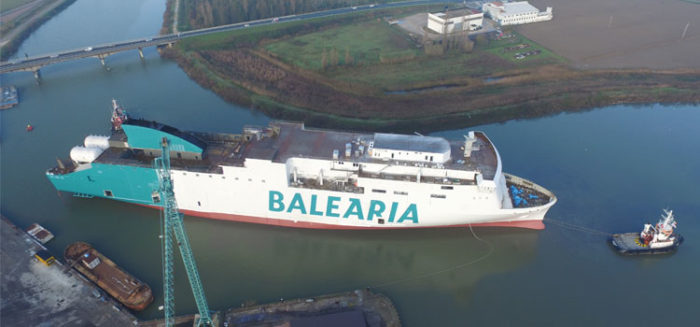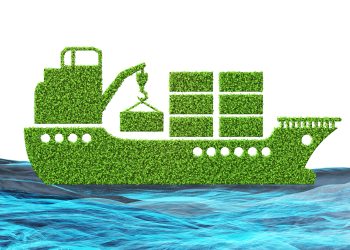Spanish ferry operator Baleària announced the launch of its newest LNG-fueled ferry ‘Marie Curie’ at the Italian shipyards Cantiere Navale Visentini. The vessel is one of the company’s two LNG-powered ferries to operate in the Mediterranean from 2019. In the meantime, construction is underway for its twin ‘Hypatia de Alejandría’, which will be performing sea tests when it will be completed.
The ‘Hypatia de Alejandría’ will begin its operations at the beginning of 2019 and the ‘Marie Curie’ will follow a couple of months later. The construction of these two LNG smart ships reached approximately 200 million euros.
[smlsubform prepend=”GET THE SAFETY4SEA IN YOUR INBOX!” showname=false emailtxt=”” emailholder=”Enter your email address” showsubmit=true submittxt=”Submit” jsthanks=false thankyou=”Thank you for subscribing to our mailing list”]
As far Marie Curie is concerned, the 50% of its construction is done and now the company focuses on the clearance of the passenger and crew areas. Both engines, LNG tanks and main equipment are already placed on board.
Meanwhile, the Hypatia de Alejandría is to be finished. Right now, the vessel is placed in a dry dock where the antifouling silicone is being applied to the live work of the hull. When ready, it will perform navigation tests using both LNG and fuel.
Both of the LNG vessels share the same features such as, 186.5 meters in length, maximum speed of 24 knots, capacity for 810 people, 2,180 linear meters of cargo, 150 vehicles, as well as LED lighting.
In addition to the two vessels, the company recently announced the construction of the first fast ferry with LNG engines to sail in the world. Baleària will invest 90 million euros in this ferry, with construction scheduled to begin next December and the vessel to enter into service in the summer of 2020.
What is more, the company has been engaged in a project to convert six of its ferries to LNG with partial funding from EU CEF (Connecting Europe Facility) project. Last week, LNG retrofitting began for one out of the six vessels. The EU supports the move by funding the project with 12 million euros, on a total investment of 72 million.
Baleària has earlier revealed its goal to have at least half of its fleet of ferries sailing with this clean energy in the following three years and reach 100% of the fleet within a period of ten years.






























































